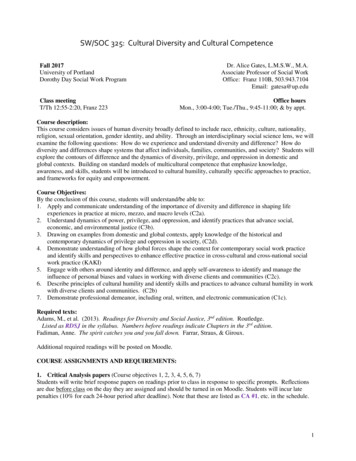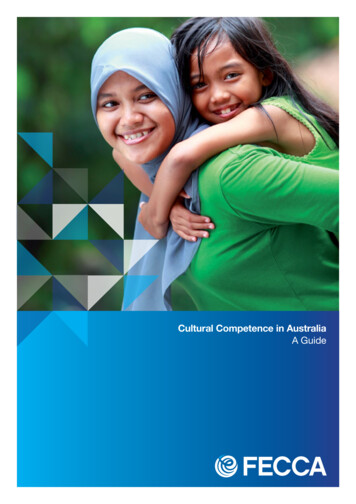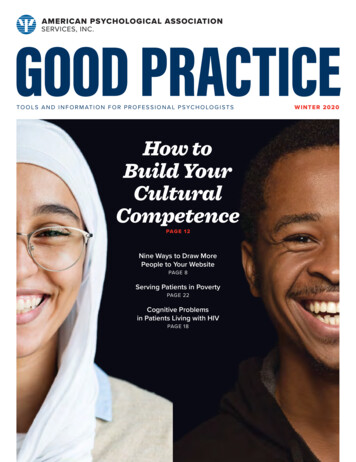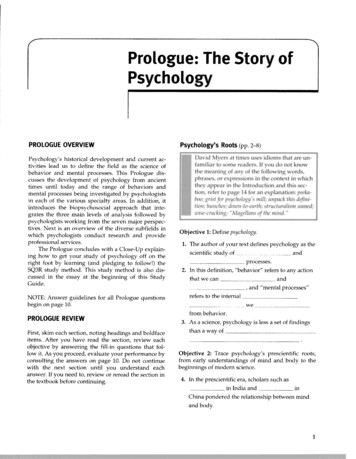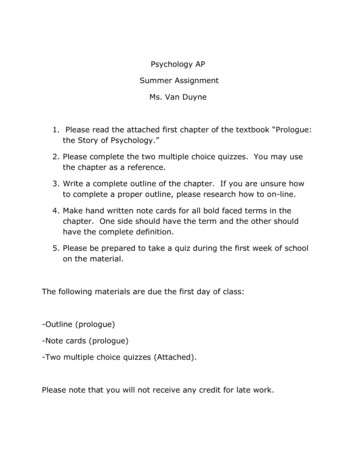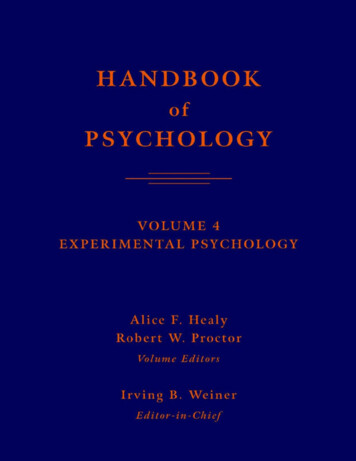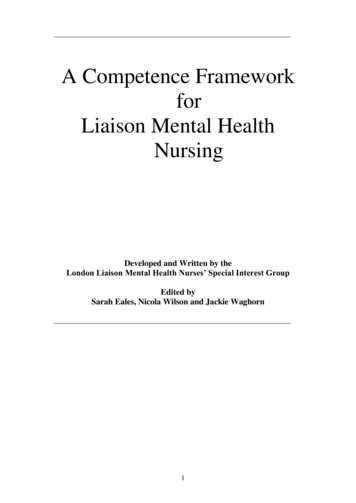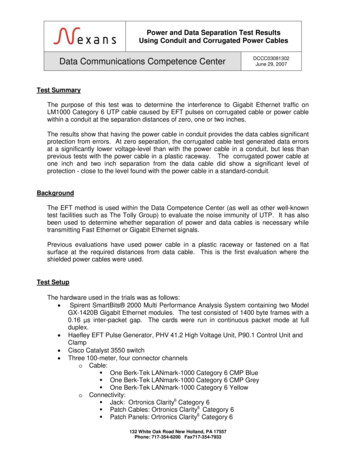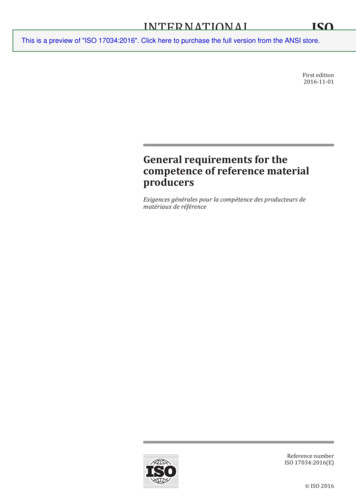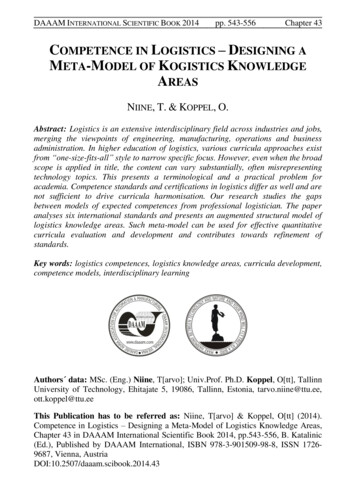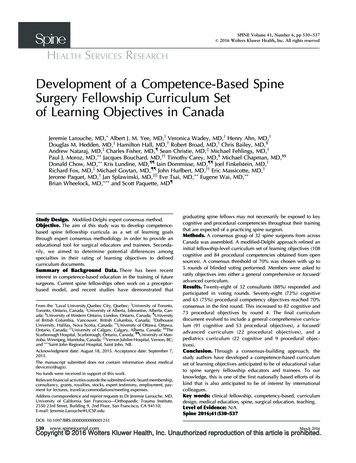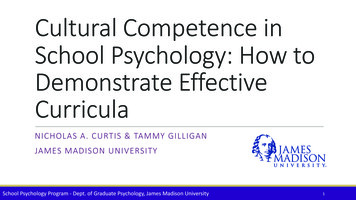
Transcription
Cultural Competence inSchool Psychology: How toDemonstrate EffectiveCurriculaNICHOLAS A. CURTIS & TAMMY GILLIGANJAMES MADISON UNIVERSITYSchool Psychology Program - Dept. of Graduate Psychology, James Madison University1
Presentation ObjectivesAs a result of this presentation, participants should be able to:1. Identify aspects of the JMU culturally competent practitioner initiative asexamples of best practice in culturally competent/responsive training.2. List and explain reasons that self-report measures of culturalcompetence/responsiveness are inadequate in providing the informationtraining programs need.3. Describe the advantages of using anchoring vignettes to adjust selfreport scores of cultural competence/responsivenessSchool Psychology Program - Dept. of Graduate Psychology, James Madison University2
Contexto School systems across the country are experiencing tremendous growth in the culturaldiversity of their student populations (Frisby & Reynolds, 2005)o Cultural biases in the schools, whether conscious or not, can have a negative effect onassessment and service delivery (Frisby & Reynolds, 2005; Imel et al., 2011)o Cross, Bazron, Dennis, and Isaacs (1989) examined the importance of culturalcompetence over twenty years ago“Operationally defined, cultural competence is the integration and transformation ofknowledge about individuals and groups of people into specific standards, policies,practices, and attitudes used in appropriate cultural settings to increase the quality ofservices; thereby producing better outcomes” (King, Epstein, & Brisbane 1997).School Psychology Program - Dept. of Graduate Psychology, James Madison University3
JMU School Psychology ProgramCentral to the program focus is the understanding of children within asystem's context, including the family, the school, and the socio-culturalenvironment. The program emphasized the role of the culturally competentschool psychologist as that of a facilitator of an individual's overall wellbeing and potential. Within an integrated theoretical framework, studentsare prepared to be culturally competent, interpersonally skilled, dataoriented problem solvers.School Psychology Program - Dept. of Graduate Psychology, James Madison University4
Curriculum - CCPIo Focused training for all students enrolled in our programo Elements include:ooooooIssues of diversity, advocacy and social justices infused in all courseRequired course on Multicultural Perspectives in InterventionPracticum experiences to include diversityProgram Sponsored Training ModulesCommunity Awareness ExperiencesEvaluation of Cultural Competencies and ResponsivenessSchool Psychology Program - Dept. of Graduate Psychology, James Madison University5
Initial InstrumentPlease rate yourself on your practical knowledge or skill in culturallycompetent/responsive assessment:Little PracticalKnowledgeRate YourselfmSome PracticalKnowledgemAverage PracticalKnowledgemGreater than AveragePractical KnowledgeAdvanced PracticalKnowledgemmCan we now collect your responses and use them to compare theknowledge and skills of everyone in the room?School Psychology Program - Dept. of Graduate Psychology, James Madison University6
Initial Instrument Results61565145MACCS score464137371st year2nd year363126.86262116116UndergraduateExpert SPSkill LevelSchool Psychology Program - Dept. of Graduate Psychology, James Madison University7
Correction ProcedurePlease read the following scenario:Juanye Alarcon, an eight year old student at Apple Elementary,was referred for a full psycho-educational in January. Juanye andhis Spanish-speaking parents moved from Guatemala at thebeginning of the year and teachers have expressed concernsabout his academic progress. He rarely speaks in class and theteachers believe that he has limited English proficiency.School Psychology Program - Dept. of Graduate Psychology, James Madison University8
Correction ProcedurePlease Consider the Response of the Two Psychologists Below:Psychologist A: Decides to use the DAS-II cognitive battery. In order toaccount for the influence of language, she decides to use the SpecialNonverbal Index. She plans to complete a full review of records and gatherinformation from the teachers.Psychologist B: Decides to use a cross-battery approach and the culturallinguistic matrix, which allows her to select the subtests, according to theapproach, with the least amount of cultural and language influence. Sheplans to conduct several observations in different settings, interview theteacher and parents, and complete a full review of records.School Psychology Program - Dept. of Graduate Psychology, James Madison University9
Correction ProcedurePsychologist A: Decides to use the DAS-II cognitive battery. In order to account for the influence oflanguage, she decides to use the Special Nonverbal Index. She plans to complete a full review of recordsand gather information from the teachers.Psychologist B: Decides to use a cross-battery approach and the cultural-linguistic matrix, which allowsher to select the subtests, according to the approach, with the least amount of cultural and languageinfluence. She plans to conduct several observations in different settings, interview the teacher andparents, and complete a full review of records.Please rate the two psychologists and yourself on practical knowledge orskill in culturally competent/responsive assessment:Little PracticalKnowledgeSome PracticalKnowledgeAverage PracticalKnowledgeGreater than AveragePractical KnowledgeAdvanced PracticalKnowledgeRate Psychologist AmmmmmRate Psychologist BmmmmmRate YourselfmmmmmSchool Psychology Program - Dept. of Graduate Psychology, James Madison University10
Correction ProcedureLittle PracticalKnowledgeSome PracticalKnowledgeInitialRatingFinal RatingInitial RatingAverage PracticalKnowledgeGreater thanAverage PracticalKnowledgeFinal RatingAdvanced PracticalKnowledgeRate Psychologist AmmmmmRate Psychologist BmmmmmRate Yourselfmmmmm Preset Expert Ratings of Scenario (always equal to option 2 and option 4) Respondent Rating of ScenarioSchool Psychology Program - Dept. of Graduate Psychology, James Madison University11
Initial Instrument Results61565145MACCS score464137371st year2nd year363126.86262116116UndergraduateExpert SPSkill LevelSchool Psychology Program - Dept. of Graduate Psychology, James Madison University12
The Madison Assessment of Cultural Competence/Responsiveness in School Psychology(MACCS)495146MACCS score4135363124262116.716116Undergraduate1st year2nd yearExpert SPSkill LevelSchool Psychology Program - Dept. of Graduate Psychology, James Madison University13
Validity of the Interpretations: MACCSo Patterns reflected known differences in cultural competence/responsivenessbetween groupso Believed to be correcting for differential interpretation of items and the “donot know what you do not know” effecto Validity of interpretations is limited due to the specificity of the overallscenarioo Can really only say that the groups differ in their culturalcompetence/responsiveness related to the specific scenarioo Good progress though!School Psychology Program - Dept. of Graduate Psychology, James Madison University14
Broader claims: MACCS-2o Recruited five experts in cultural competence/responsiveness relatedspecifically to school psychologyo Average of 24 years experience in culturally competent/responsive schoolpsychology practiceo Average of more than 11 graduate courses or seminars focused on culturalcompetenceo 3/5 fluent in a language other than English (2/5 learned English as a secondlanguage)o 5/5 have lived in a country other than the United Stateso Surveyed experts to generate list of essential traits typical of an expert inculturally competent/responsive school psychology practice.School Psychology Program - Dept. of Graduate Psychology, James Madison University15
Broader claims: MACCS-2o Expert responses corresponded with previous research and were used to identify whichexperts would write which items.ooooooooooooooCulturally competent/responsive cognitive assessmentCulturally competent/responsive academic assessmentCulturally competent/responsive intervention effortsCulturally competent/responsive response-to-interventionCulturally competent/responsive understanding of acculturationCulturally competent/responsive self-awareness and recognition of biasesCulturally competent/responsive willingness to learn about others beliefs, attitudes, and valuesCulturally competent/responsive understanding of one's own limitations and when to seek helpCulturally competent/responsive understanding of institutional biases and positive changesCulturally competent/responsive counselingCulturally competent/responsive family consultationCulturally competent/responsive student supportCulturally competent/responsive student-family communicationCulturally competent/responsive support of LGBTQ studentsSchool Psychology Program - Dept. of Graduate Psychology, James Madison University16
Broader claims: MACCS-2o 2 to 4 items were written by each of the experts, including an expert inworking with the LGBTQ community.o All 16 items were then presented to a group of 7 experts consisting of a mixof item writers and non-item writers. This was to ensure that experts wererating the scenarios as 2 and 4 respectively.o 15 items resulted in less than a .3 difference from 2 and 4. 1 Item resulted in anaverage of .75 difference from 2 for the lowest scenario and was dropped fromthe final item list.o Items were then piloted with a convenience sample of school psychologystudents in the 1st year, 2nd year, and 3rd year of a Masters/Ed.S. levelprogram.School Psychology Program - Dept. of Graduate Psychology, James Madison University17
MACCS-2: New ProcedurePlease read the following scenario:A 3rd grade child is referred for a special education assessment. This child isidentified as an English language learner by the district and is receivingEnglish language acquisition support daily. As the school psychologist, youare determining what cognitive assessment measures you will give to thischild. What will influence your decision?Please take a few moments to consider how you would respond to thissituation.School Psychology Program - Dept. of Graduate Psychology, James Madison University18
MACCS-2: New ProcedurePlease take a few moments to consider the responses of two hypothetical schoolpsychologists.Psychologist A responds: I would consult with his English languageacquisition teacher and his parents about his language development. Sincehe has been in the schools for a few years and he will likely have goodEnglish skills, there are many different cognitive assessments I could give.Psychologist B responds: First I would need to learn more about Englishand native language proficiency and obtain state language proficiency testresults over time. Depending on the amount of language input andinstruction in the native language and English, I would determine if a nativelanguage assessment is warranted. If the student has more developedEnglish language proficiency but is not yet fluent, cognitive measures willbe selected that have a lower linguistic and cultural loading.School Psychology Program - Dept. of Graduate Psychology, James Madison University19
MACCS-2: New ProcedurePlease rate Psychologist A, Psychologist B, and yourself on practical Awareness,Knowledge, or Skill concerning culturally competent/responsive cognitive assessment.(Practical knowledge, awareness, and skill is information or abilities that can be usedright now)Little PracticalKnowledgeSome PracticalKnowledgeAverage PracticalKnowledgeGreater thanAverage PracticalKnowledgeAdvancedPracticalKnowledgeRate Psychologist AmmmmmRate Psychologist BmmmmmRate YourselfmmmmmSchool Psychology Program - Dept. of Graduate Psychology, James Madison University20
MACCS-2: Results70Before Correction!656054MACCS score555050454642403530252015First YearSecond YearThird YearExpertsSkill LevelSchool Psychology Program - Dept. of Graduate Psychology, James Madison University21
MACCS-2: Results70With Correction65605355MACCS score6050444540373530252015First YearSecond YearThird YearExpertsSkill LevelSchool Psychology Program - Dept. of Graduate Psychology, James Madison University22
Potential Uses of the MACCS-2o NASP Accreditationo NASP Program Standards Rubric Element 4.1o “ evidence that candidates acquire knowledge of cultural influences on academic skills; humanlearning, cognitive, and developmental processes; and evidence-based curriculum and instructionalstrategies.”o Institutional Responseo Many institutions ask programs to demonstrate exemplary assessment of learningo Direct evidence of student learning is observable, specific, and measureable and tends to be morecompelling evidence of exactly what students have and have not learned.o Curriculum Development/Learning Improvemento This is what we, as educators, are all abouto What are the strengths and weaknesses of our curricula and student experiences?o Where can we best focus our effort, time, and attention?School Psychology Program - Dept. of Graduate Psychology, James Madison University23
Invitation to partner on the MACCS-2o Initial validity evidence is promising to be able to make the inferencesthat we want to makeo Patterns of responses align with expectations given explicit interventionso Experts developed and cross-validated the items on the scaleo Experts consistently rate the scenarios at level 2 and 4 respectivelyo We are now beginning to collect further validity evidence to see if theinterpretations of student MACCS-2 scores hold across school psychologyprograms.o Please see us at the conclusion of the presentation if you would like topilot the MACCS-2 at your institution. Program-level reports will beprovided to all programs who participate.School Psychology Program - Dept. of Graduate Psychology, James Madison University24
JMU School Psychology Program Central to the program focusis the understanding of children within a system's context, including the family, the school, and the socio-cultural environment. The program emphasized the role of the culturally competent . School Psychology Program -Dept. of Graduate
